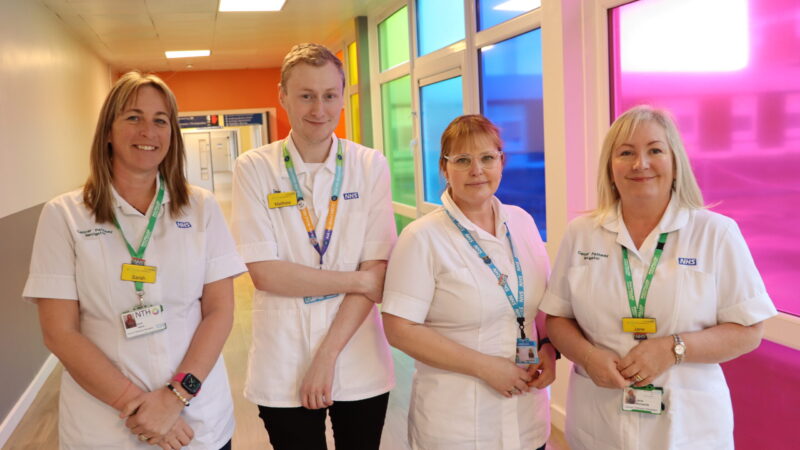
The Trust has introduced a new role to support people through their cancer diagnosis journey.
Our new cancer pathway navigators provide help and care to patients as they go through investigations for potential cancers.
The four navigators work in three slightly varying roles. But they all have common goals in mind – enhancing patient experience and encouraging appointment uptake.
From the moment someone is referred onto a cancer pathway, the navigators assist with appointment arrangements, provide advice and reassurance and can also make referrals to other services – for example support to cut down alcohol intake or counselling.
They also work to ensure that people receive a cancer or non-cancer diagnosis within 28 days of referral from a GP or screening service to meet the national NHS Faster Diagnosis Standard.
Jane’s role
Jane Richards is a cancer pathway navigator in the lung and gynaecology services at the Trust. She said: “My colleague Sarah and I follow people through their journey, from referral through to investigations and imaging to diagnosis.
“We’re a much-needed point of contact for people who require that bit of extra help. Waiting to find out if you have cancer is such an anxious and stressful time. Just having a dedicated person who you can ring with questions and concerns, or just get a bit of support, is so beneficial.”
Support during diagnosis
Statistically, 90% of people referred onto cancer diagnostic pathways will not have a diagnosis of cancer. This support service reassures people throughout the investigation process, regardless of outcome.
The navigators support patients from referral into the Trust – or, in some cases, community cancer screening – up until either a cancer or non-cancer diagnosis is made. They work closely with the Trust’s cancer care coordinators who continue care if a patient received a cancer diagnosis.
If a diagnosis of non-cancer is made but the team has identified that there’s a need for wellbeing support, care doesn’t end here. The patient is referred onto a social prescribing link worker – a role which connects people to community-based signposting, advice and support.
A large part of the navigators’ role also includes practicing ‘Making Every Contact Count’. The team use their day-to-day interactions to support patients in making meaningful, positive changes that impact on health and wellbeing. For example, quitting smoking.
Michelle’s role
Michelle Whittaker is a cancer pathway navigator supporting people throughout the Tees Valley Targeted Lung Health Checks Service. This is open to those between the ages of 55 and 74 who are registered as a smoker or ex-smoker.
She works alongside her counterpart at South Tees Hospitals NHS Foundation Trust as a consistent point of contact for those taking part in lung screening across the Tees Valley.
Michelle said: “From their screening appointment, we manage patients to make sure they’re on the cancer pathway if needed. We track patients through to, hopefully, not a cancer diagnosis. But if a cancer diagnosis is confirmed, they’ll receive treatment at one of the trusts.
“Without the screening service and the extra support, there’s some people out there who might have been coming in in a year or two under different circumstances – and treatment options would be limited.”